39. Warren B. Rudman
Located: 3rd floor, outside Courtroom 3
Exhibited: Warren B. Rudman
This United States Courthouse bears the name of a favorite son of New Hampshire. A Korean War combat veteran, Warren Rudman served for six years as New Hampshire’s Attorney General (1970-1976) and for twelve years as our United States Senator (1980-1992).

Warren B. Rudman
This United States Courthouse bears the name of a favorite son of New Hampshire. A Korean War combat veteran, Warren Rudman served for six years as New Hampshire’s Attorney General (1970-1976) and for twelve years as our United States Senator (1980-1992).
Rudman’s career in public service embodied toughness and political independence, two long-standing signature attributes of the Granite State. As Attorney General, he was known to be bullish on important matters while always remaining decent and civil in dealing with the public. In 1980, he set the tone for a principled Senate tenure by refusing to accept campaign contributions from out-of-state political action committees. Once in Washington, the Senator’s aggressive but pragmatic approach to difficult issues earned the respect and cooperation of his congressional colleagues, regardless of party.
Simply put, Rudman believed in hard work, integrity and common sense. As a junior senator, he placed the burgeoning federal deficit, and his assessment of its threat to the nation, squarely before Congress and the American people. He co-sponsored groundbreaking legislation (the Gramm-Rudman Act) that provided a pathway to a balanced federal budget, and devoted his considerable energy and persuasive abilities to ensure its enactment. He served on numerous Senate committees, including Appropriations, Intelligence and Ethics. Senator Rudman presided as vice-chair in hearings on two especially heated investigations (“Iran-Contra” and “Keating Five”), where his outspoken and frank commentary revealed a disdain for playing politics and a fierce commitment to the truth. The national press dubbed the New Hampshire statesman the “straight-talking ethical conscience of the Senate.”
Equally significant to Senator Rudman’s legacy was his unfailing dedication to the cause of justice. He was a strong proponent of federally funded legal aid for the poor, which he considered essential to the notion of equal access to the courts. Confronted with annual budget proposals that purposefully omitted Legal Services Corporation support, Rudman repeatedly organized bipartisan support to save its funding. Moreover, with an eye toward assuring excellence in jurisprudence, he was instrumental in securing the appointment of several distinguished federal jurists who have since presided over this District Court, the United States Court of Appeals for the First Circuit, and the United States Supreme Court.
Rudman declined to run for a third Senate term, but remained active in governmental affairs. He continued to advocate for fiscal responsibility, including campaign finance reform. In 1992, he co-founded the Concord Coalition, a non-partisan, national organization that educates the public on the negative consequences of irresponsible deficit spending and promotes sustainable economic policy. In 1993, President Clinton appointed Rudman to the President’s Foreign Intelligence Advisory Board, where he served for eight years. He co-chaired the United States Commission on National Security, which in February 2001 presciently warned of terrorist attacks on American soil. Rudman was awarded the Presidential Citizen’s Medal -- the nation’s second highest civilian honor -- that same year.


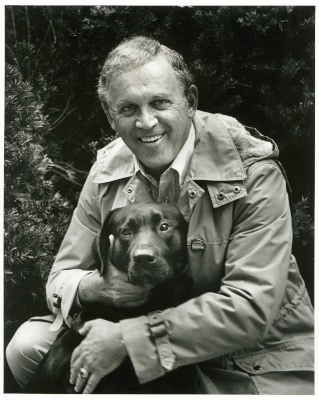
Warren B. Rudman (1930-2012)
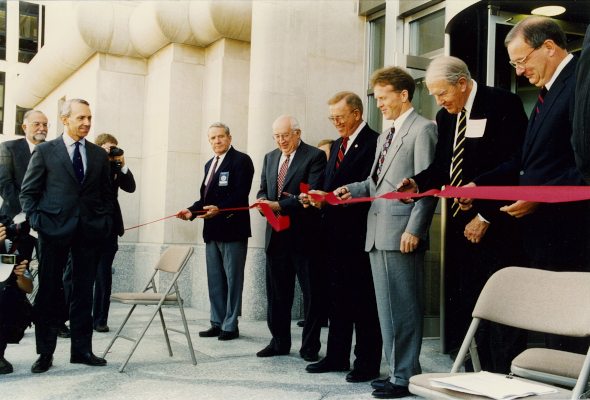
"In the final analysis, the federal court system...ensures that our constitutional rights are forever preserved, and that is why I'm so delighted that this building bears my name."
- Warren B. Rudman, September 19, 1997 at Rudman Courthouse Dedication
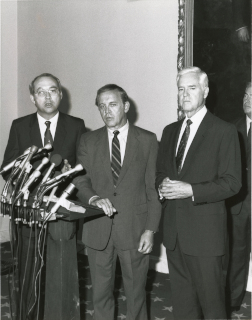
Senators Phil Gramm -TX, Warren B. Rudman - NH, and Ernest Hollings - SD

Korean War Veteran
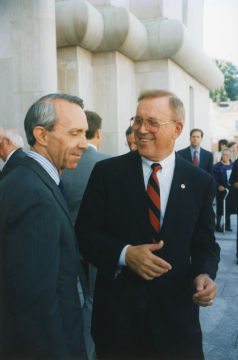
Supreme Court Justice David Souter and Sen. Warren B. Rudman.
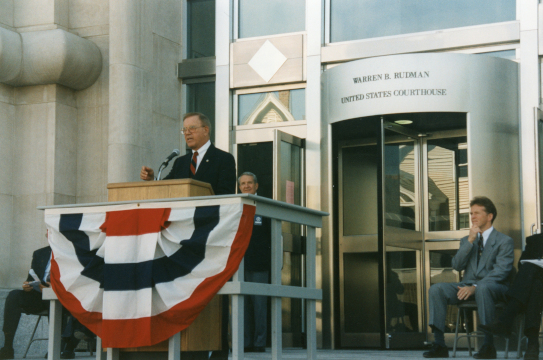
"To me, this building is about...the people who will come into it under stress, who will be dealt with fairly by the American justice system."
- Warren B. Rudman, September 19, 1997 at Rudman Courthouse Dedication
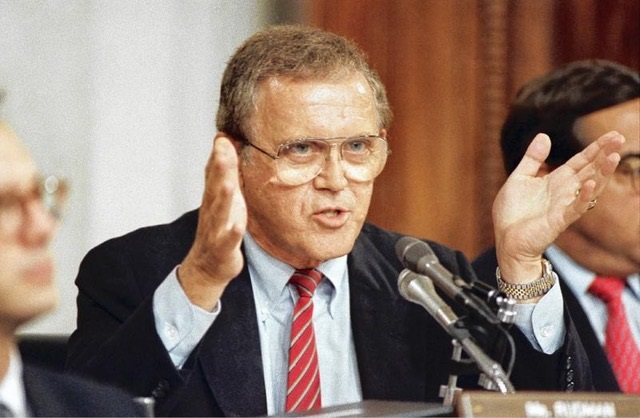
The Advocate, arguing an issue at the Iran-Contra hearings



